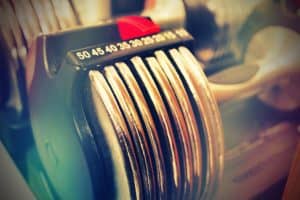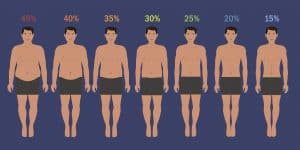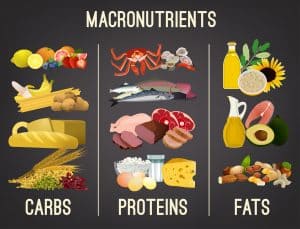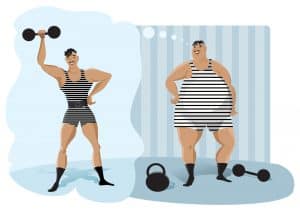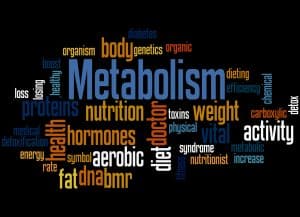For months I was exerting some serious effort in an attempt to shed the stubborn fat hanging around my waistline. The issue—I’d plateaued and was getting nowhere.
My gym buddies suggested I try a HIIT session on an empty stomach to see if it would do the trick.
I’m here to share what I learned about fasted cardio.
- Table of Contents
What Is Fasted Cardio?
In simple terms—fasted cardio is any form of cardiovascular exercise that’s performed after a long period without eating—while the body is in a fasted state.
The most natural example of fasting is at night time—when sleeping.
As a result, hitting the gym before you’ve tucked into your eggs, toast, or overnight yogurt, is deemed the prime time for this pursuit.
However, for those who are practicing intermittent fasting, cardio can be incorporated into other times of the day, depending on the method they’re following.
What makes this concept attractive is that it’s purported to enhance fat-burning and therefore maximizes fat loss.
Many adherents to fasted cardio say three to four hours without food is sufficient. Yet, experts indicate longer periods define a “true” fasting status.
The Science Behind Fasted Cardio
Carbohydrates are the body’s first choice for energy. Once ingested it’s either converted into glucose for use or stored as glycogen.
When you cut out food, and therefore, don’t replenish your fuel supplies, the body has to take a different approach.
Firstly, the previously stored glycogen is called upon, and the reserves are used. Once depleted it then looks for another contender to extract fuel from.
In this case—fat.
The body homes in on these fat stores and turns them into glucose to keep going. Hence, theoretically, you could already be in fat-burning mode before you start working out.
If you add cardio into the equation, the metabolism heightens and demands for energy increase. This should mean an even higher rate of fat-burning.
Insulin also plays a part.
This hormone is responsible for controlling blood sugar, which elevates when we eat. It then converts that sugar into energy to use immediately or into fat for the future.
Exercising before breakfast means insulin levels will be lower, therefore fat burns easier and faster.
One further point I‘d like to make. Stored body fat requires a sufficient amount of oxygen to convert into energy.
For well-trained individuals, their peak fat burning level happens at around 59 to 65 percent of their maximum oxygen consumption (VO2 max; the maximum amount of oxygen a person can use during the workout session. It’s a measure of aerobic endurance during the workout). Whereas, general gym-goers may reach their sweet spot at 47 to 52 percent of their VO2 max.
Meaning, the intensity, and duration of your training session could significantly influence the ability to burn fat successfully.
It’s one of many factors to consider before determining if fasted cardio is suitable for you, and how to train accordingly.
The variables around efficient fat loss are vast, but it isn’t the only purported benefit of this method.
The Benefits of Fasted Cardio

If you delve into the scientific evidence, you’ll discover studies are limited and findings often inconsistent. However, anecdotal reports point toward potential advantages when performing cardio on an empty stomach.
1. Yes, It Burns More Fat!
As we’ve seen, it’s the main appeal for many fans, and here’s why:
According to this study, up to 20 percent more body fat was burned by those fasting pre-workout compared to those who ate breakfast.
Another research paper documented similar results, in that participants who fasted prior to exercise experienced higher rates of fat oxidation. Experts concluded—when in a fasted state, the body is more dependent upon fat during periods of physical activity.
However, there was also a correlation between lower calorie (energy) intake and fasted cardio days (i.e. fasted cardio was found to be associated with low calories consumption)—a trend which continued for the entire 24 hour period.
2. Increases Insulin Sensitivity
If you’re at risk for type 2 Diabetes or other blood-sugar related issues, adding fasted cardio into your regime could benefit you long-term.
Researchers have noted that not only are morning glucose levels lower, but muscle metabolism increases. Furthermore, blood sugar levels stabilize during a cardio workout.
Moderate training is shown to improve insulin sensitivity short-term, while insulin action (control blood glucose levels) can benefit long-term.
If you already have type 2 Diabetes or any other health condition, you need to clear fasted cardio with your physician.
3. Improves Performance
When doing cardio, performance is reliant on your body’s ability to bring in oxygen. As described earlier, our VO2 max is the highest amount of oxygen we consume during a workout.
One study shows that exercising in a fasted state can help increase our VO2 max. Meaning, we up the amount of oxygen delivered to our muscles in a given workout—which allows us to work harder during that period.
If you’re concerned about endurance in a fasted state, you may not need to be. You should still be able to reach your optimum levels of fitness and possibly with less effort than when in a fed-state.
4. Mission Accomplished
When do you prefer to train? Are you an early bird at the gym or do you prefer working out post-work?
The time pressures in today’s world can often mean that the HIIT session you were planning on turns into a “miss.” Unexpected distractions can get in the way of any best-laid plans you have later on.
Training first thing in the morning, the time for fasted cardio, eradicates the chances of this happening—unless you hit snooze of course.
Best Fasted Cardio to Perform
For the seasoned gym enthusiast, 30-60 minutes of fasted cardio with a moderate-to-high effort should be sustainable. This can include your standard HIIT, intervals, squat jumps, mountain climbers, and more.
However, if you’re new to this approach, many recommend adapting your usual high-intensity sessions to a more manageable workout—until you adjust. Don’t give in to the temptation of thinking going hard is necessarily the best from the get-go.
Not only could you benefit from a change in routine, but lower intensities are found to be beneficial for your cortisol levels. This means metabolism enhances, higher immunity, and response to stress improves.
Examples of low-intensity exercises to incorporate into a fasted cardio routine include jogging on the treadmill, aerobics, rowing, using the elliptical, or even just a walk outside.
One further note, regardless of experience, avoid fasted cardio durations over the hour mark. This should keep your musculature breakdown to a minimum, and reduces the chance of your performance suffering.
Fasted Cardio on Keto Diet
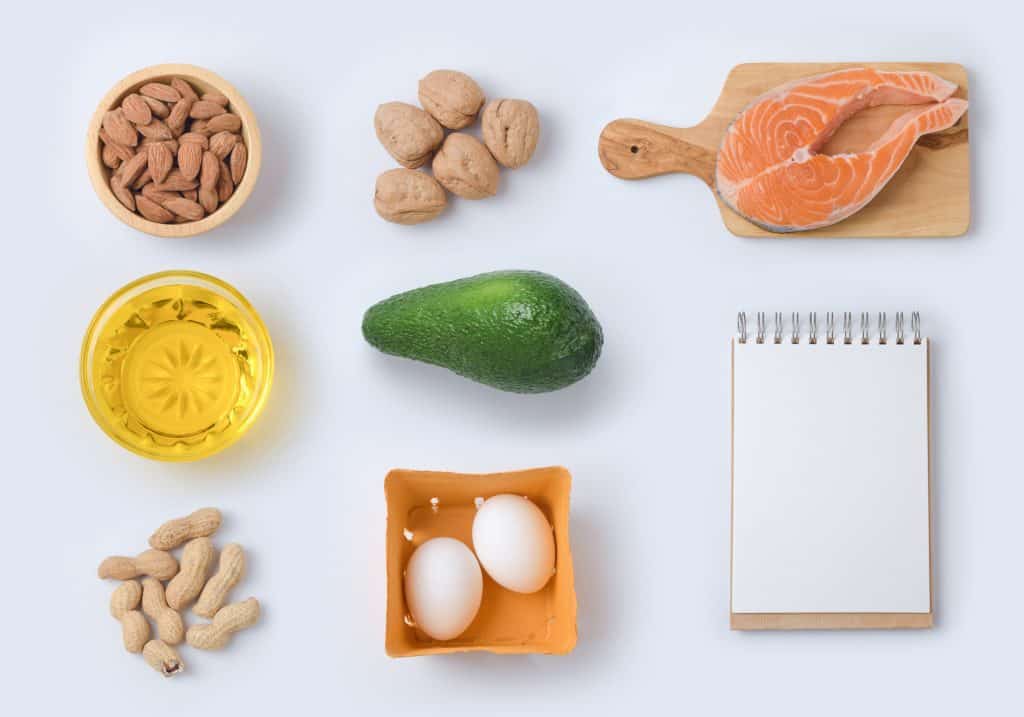
For those that don’t know, the ketogenic diet is a high-fat, extremely low-carb diet, with the same aim as fasted cardio—to optimize fat burning. Those following this dietary lifestyle drastically reduce their carbohydrates and replace them with healthy fats (think: avocados, nuts, etc.).
Due to the cut in carbs for energy, the body enters into a state called “ketosis.” Here, the body turns to a specific type of fat, ketones, for fuel.
If you’re a newbie to Keto, it is not the time to launch into an intense workout program coupled with fasting. Give your body a few weeks to adjust.
For those familiar with Keto, you might be thinking, my glycogen stores are already depleted—I’m in ketosis. Is fasted cardio going to benefit?
Opinions from keto aficionados are that your body is already “fat-adapted”, therefore it’s easier to drop fat mass. However, official evidence to support this theory is yet to be confirmed.
Furthermore, if your cardio session is super intense, you could run the risk of “hitting the wall”. When performance levels drop too often, it’s going to affect your results.
With that said, if you feel fasted cardio is for you, give it a try. If you start to feel fatigued and don’t see the results you’re looking for, skipping that pre-workout keto-friendly breakfast could be to blame.
What to Eat After Fasted Cardio
Within 30 minutes, or at the latest, two hours of cardio training, consume a balanced meal. Depending on the duration and intensity of your workout, this will differ accordingly:
Low-to-Moderate Intensity Fasted Cardio
Those who finished a low-to-moderate intensity fasted cardio session lasting under an hour, a meal, or shake with adequate protein is enough. 20 to 30 grams of lean protein is recommended for optimal muscle protein synthesis to occur. Examples include eggs, chicken, or fish.
For this group, carbs are optional but, if you plan on a second training session, it’s advisable.
Moderate-to-High Intensity Fasted Cardio
If you performed at a higher intensity level of fasted cardio, say with a powerful HIIT routine, you’ll take it up a notch.
Have your protein as stated above, but pair that with some rapid-digestible carb-rich foods (30-40 grams) such as rice, pasta, white bread, and dried fruits.
Insulin, derived from sugars in those ingested carbohydrates, is shown to stimulate protein synthesis.
If you plan on lifting weights later in the day, carbs are even more important, as it ensures muscle glycogen levels are sufficient enough to sustain that session.
Will You Lose Muscle on Fasted Cardio?
Earlier, I mentioned how the body searches for alternatives when it’s preferred fuel is in short supply. The issue is, another energy substitute is muscle. Hence, if you’re tempted to try fasted cardio and you’re concerned about losing mass, beware.
Research has shown that this workout plan can have a catabolic effect on muscle.
Studies reveal training under fasted conditions promotes proteolysis (protein breakdown)—which can also continue for up to 24 hours following physical activity.
In this analysis, a 60-minute cycling session recorded a drop in protein levels of 10 percent. Nitrogen retention also depleted twofold compared to fed-state results.
What’s more, these experts also declared fasted cardio is not for those seeking to gain muscle or strength.
Can You Have Coffee Before Fasted Cardio?

Hitting the gym minus the morning pre-workout coffee could have some of you groaning under the covers (and I don’t mean sexually). The good news is that it doesn’t have to be that way.
While some would say otherwise, fans of fasted cardio encourage not giving up that coffee. The benefits of caffeine on performance are just too good to pass up.
Caffeine is proven to:
- Enhance focus.
- Lessen fatigue.
- Increase endurance.
- Boost metabolism.
- Promote fat burning.
- Elevate energy levels.
All of the above enable individuals to train for longer—meaning more fat-burn.
The optimal time to drink that cup of joe is 30-60 minutes before working out. When taken as a supplement, the caffeine dosage usually falls between 200 and 400 milligrams.
What does that mean for your favorite morning beverage?
One 8-ounce cup of drip coffee contains around 95 mg of caffeine. A single shot of espresso comes in at 63 mg. These numbers fall below what a supplement could provide, but it’s not to say a cup is without its benefits.
Don’t forget you’ll need to take it black. Milk or sugar would mean breaking your fast too soon.
Myths About Fasted Cardio
Based on what we have, there’s some validity to the claim that fasted cardio may enhance fat loss.
However, research does back up one of the popular beliefs discussed by the anti-fasting cardio crowd.
It’s yet to be determined if long-term body composition changes will differ between individuals fasting before training and those that aren’t. As previously mentioned, findings on fasted cardio are still in its infancy, and as a result, studies are limited.
It may leave you wondering if fasted cardio is necessary for significant fat loss to occur.
We know there’s evidence that points to fasted cardio driving up performance levels while driving down appetite. Both of these factors could, in the long run, lead to more optimal fat-burning states.
Bottom Line
Similarly to the scientific evidence, some people swear by fasted cardio, whereas others quite frankly—think it’s all hype. Exercise, regardless of when you eat, will always benefit your weight and fat loss goals.
It all comes down to personal choice and what works best for your training and lifestyle. Can you postpone eating for a couple more hours? If you’re looking for an alternative to potentially drop fat at a faster pace, it could be worth a shot.




